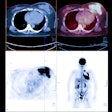A new race is on in therapeutic nuclear medicine as two California biotechnology companies advance their respective work on radiolabeled antibodies for treatment of lymphoma.
Coulter Pharmaceuticals of South San Francisco last month received a patent for Bexxar (I131 tositumomab) for the treatment of various types of non-Hodgkin's lymphoma (NHL). Developed in partnership with SmithKline Beecham, Bexxar is a monoclonal antibody with the radioisotope iodine 131 attached to it. The antibody recruits the immune system to attack NHL cells through targeted therapeutic radiation, while minimizing exposure to normal tissues.
Bexxar dosage depends on how an individual clears the antibody, said Dr. David Magnuson, director of medical information and safety at Coulter. Dosimetry is based on three infusions to determine the resident time of the I131 and calculate the therapeutic dose.
Coulter presented the combined data of several Phase III clinical trials at the American Society of Hematology (ASH) meeting in December 1999. According to the results, high response rates and long durations of cancer remission were achieved with Bexxar when used to treat low-grade or transformed low-grade NHL.
Dr. Julie Vose, vice chair at the University of Nebraska Medical Center in Omaha, reported the combined data on 179 patients with low-grade NHL. Eighty-one percent responded to Bexxar, while 39% experienced a complete response.
Dr. Andrew Zelenetz, chief of Lymphoma Service at Memorial Sloan-Kettering Cancer Center in New York City reported that 53% of the 58 transformed low-grade NHL patients that were given Bexxar responded to the radiolabeled antibody. Another 29% experienced complete remission, Selenetz said.
Finally, Dr. Mark Kaminski, director of the Leukemia/Lymphoma Program at the University of Michigan in Ann Arbor presented data on how Bexxar worked on 14 patients with small lymphocytic lymphoma. Eleven patients responded to the therapy while three experienced a remission of their disease, he said.
Coulter is in the process of filing an application with the Food and Drug Administration clearance for Bexxar.
In the meantime, IDEC Pharmaceuticals of San Diego is testing its own radiolabeled monoclonal antibody for NHL. Zevalin will act as a complement to Rituxan, another monoclonal antibody. Zevalin (ibritumomab tiuxetan) targets the CD20 antigen and is linked to the 90Yttrium radioisotope would be used on patients who are resistant to chemotherapy or to Rituxan alone.
At the same ASH meeting, IDEC offered the preliminary results of four clinical trials of Zevalin. Dr. Thomas Witzig of the Mayo Clinic in Rochester, NY presented data that compared Zevalin plus Rituxan to Rituxan alone in 90 patients with relapsed or refractory, low grade follicular or transformed CD20-positive, B-cell NHL. The Zevalin group had an overall response rate of 80%, while the Rituxan group came in at 44%.
Witzig also offered results from a Phase II trial that evaluated the efficacy of Zevalin at a reduced radiation dose. In 22 patients, 23% achieved a complete response with 45% achieving a partial response.
In a third trial, Dr. Leo Gordon of Northwestern University in Chicago evaluated the efficacy and safety or Zevalin in follicular NHL patients who did not respond to Rituxan alone. Forty-six percent achieved a response when Zevalin was part of the treatment protocol. In a related presentation, Dr. Gregory Wiseman of the Mayo Clinic summarized the dosimetry in the Northwestern study and found that the Zevalin/Rituxan combination did not provide a higher radiation dose to normal body organs.
One of Zevalin's selling points is that dosage could be based on patient weight and baseline platelet count without complex dosimetry.
IDEC plans to hold off on seeking clearance from the FDA until the fourth quarter of 2000 in order to demonstrate longer duration of remission, according to Reuters.
Whether radiolabeled antibodies will one day become the standard in NHL treament depends on continued research, Magnuson said.
"It's too early to tell what the sequential use of these different therapies will be. These are very new tools," he said. "How they are going to be used, where they are going to fall best in the therapeutic sequence, we don't know. Right now, there is no magical sequence for lymphoma therapy."
However, the similarities between the two lymphoma treatments may need to be dealt with first because the patent for Bexxar is similar to the one IDEC already holds for Zevalin. A spokesperson for IDEC could not be reached for comment, but a financial analyst at Deutsche Banc Alex. Brown suggested that litigation may be inevitable (CBS MarketWatch).
By Shalmali Pal
AuntMinnie.com staff writer
March 13, 2000
Let AuntMinnie.com know what you think about this story.
Copyright © 2000 AuntMinnie.com
















